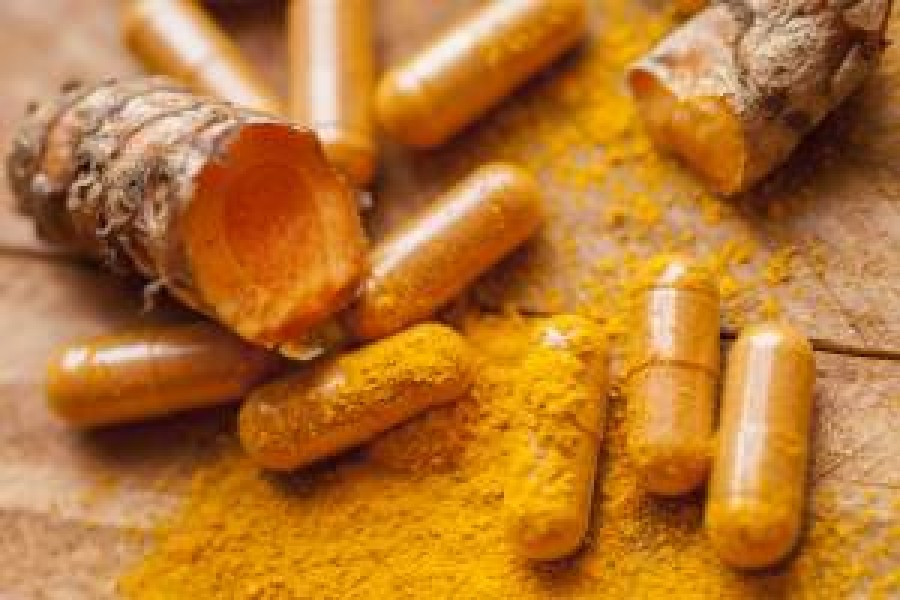Free shipping for orders over 39.00€
Turmeric and curcumin, the nutritional “gold” treasure for our body

It has slipped into our lives only recently, although it “reigns” in the culture of Asian countries for centuries, having a dominant role in both local cuisines and traditional medicine. We talk about turmeric, the golden-yellow spice produced in the countries of Asia, India, and Central America that nowadays, has conquered the rest of the world.
Turmeric is a root with a bright yellowish-orange flesh inside, grown for at least 5,000 years in the tropics of Asia and reached the West through Arab traders in the 13th century. It can be used fresh, but most commonly, is used is in seasoning form.
Turmeric is directly related to the culture and nutrition of the Indians, as the main ingredient of the well-known spice curry – which in fact is a mixture of coriander, cumin, and yellow root (the Greek name of turmeric) - which in this country is consumed daily.
Its widespread use in traditional Chinese and Indian medicine for millennia has led scientists to study the spice with the slightly spicy taste, to record the antioxidant, anti-inflammatory, and neuroprotective properties it contains, thanks to its key ingredient, curcumin. Furthermore, nutritionists suggest that we use turmeric as a food supplement, where possible, to improve our health, and one can already find dozens of applications of turmeric in daily cooking.
So, what is curcumin?
Curcumin is the main active ingredient of turmeric, at about 80%. The polyphenol in question is associated with many healing characteristics. Specifically:
✔️It has a strong anti-inflammatory effect (inflammations such as arthritis or tendonitis)
✔️It has antioxidant activity (neutralizes free radicals)
✔️Helps increase the hormone BDNF (brain hormone)
✔️Helps reduce heart disease
✔️Contributes to cancer prevention
✔️Strengthens the body in preventing Alzheimer's disease
✔️Contributes to the prevention and treatment of depression
✔️Helps prevent premature aging
✔️Helps to cope with various skin diseases (i.e., acne)
✔️Helps reduce body fat
However, there is a small "drawback" to curcumin. Turmeric has a low curcumin content and turmeric studies use extracts containing curcumin in doses exceeding 1 gr. per day, when the recommended consumption of turmeric should not exceed 1-3 gr. per day.
In other words, it is not enough to only add spice to your diet, to reach the desired levels of curcumin intake, but it would also be needed to take it in the form of a dietary supplement.

Simultaneously, researchers have identified that curcumin has poor absorbability by taking it orally. A proposal addressing the issue comes from India, where people consume curry meals along with oil, as this combination increases its bioavailability.
Otherwise, you can get products that are widely marketed and combine curcumin with other substances, such as piperine, which is produced from black pepper. Piperine is a natural substance that enhances the absorption of curcumin by 2000% - it is known that piperine affects intestinal permeability in a way that many components that are difficult to absorb show increased uptake by tissues when combined with it.
In this case, it would be advisable to determine the daily dosage with your doctor, as it is usually suggested that the use of curcumin supplements should not exceed one month period.
Are there contraindications to turmeric?
In some cases, taking turmeric or curcumin supplements should be done with the consent of a specialist.
‼️If you are on anticoagulants treatment: curcumin may slow blood clotting, so if you are taking blood-thinning treatment, consult your doctor before consuming foods or supplements with curcumin.
‼️If you suffer from diabetes: turmeric can lower blood sugar levels.
‼️If you experience gallbladder problems: curcumin can aggravate the situation, in case of stones in the bile or some other problem.
‼️If you are pregnant: it is suggested to avoid the use of curcumin during pregnancy, because it can cause uterine contractions.
‼️If you suffer stomach disorders: research has shown that curcumin can be effective for stomach pain, however it can worsen a patient with gastroesophageal reflux.






